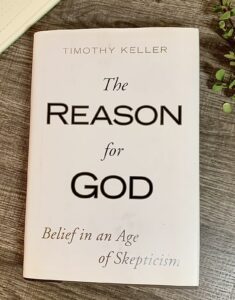The Importance of Christian Apologetics

The Question
Is a hotdog a sandwich? I know for a fact that some of you would die on a hill defending why you would say yes or no to this question. Go ahead, think about your answer. Think of all the reasons why this concession food entrée can be defined as one thing or the other. What are the facts? Maybe it’s a sandwich because it’s a piece of meat between two portions of bread. Or maybe it’s actually one piece of bread which the meat lays on top of, and maybe that makes it a non-sandwich. Is “non-sandwich” a word?
No matter how you answer these questions, now you are starting to think about what you would say if someone asked you. You’re welcome, I’ve just prepared you for the most heated debate of your life.
We can joke, but you see that when you hold an opinion — especially a strong opinion, —you defend it. You are capable of defending it. You might not be a sandwich expert, but who says you need to be? Now let’s apply this to the Christian faith. Who knew you could jump from hot dogs to Christianity! Why should a Christian know how to defend their faith?
What the Bible Says
 We should learn how to defend our faith because the Bible teaches us to; it’s our calling as believers. 1 Peter 3:15 says “but in your hearts honor Christ the Lord as holy, as always being prepared to make a defense to anyone who asks you for a reason for the hope that is in you; yet do it with gentleness and respect…” This verse perfectly and directly expresses that we need to be prepared to provide a reason for our faith. Then, with “gentleness and respect,” we are called to action. We should prepare our “reason” and go tell the world, with the love of Christ represented in our hearts and minds.
We should learn how to defend our faith because the Bible teaches us to; it’s our calling as believers. 1 Peter 3:15 says “but in your hearts honor Christ the Lord as holy, as always being prepared to make a defense to anyone who asks you for a reason for the hope that is in you; yet do it with gentleness and respect…” This verse perfectly and directly expresses that we need to be prepared to provide a reason for our faith. Then, with “gentleness and respect,” we are called to action. We should prepare our “reason” and go tell the world, with the love of Christ represented in our hearts and minds.
Before continuing, though, I want to pause at this idea of loving Christ with our minds. We know that we should love the Lord our God with all our heart, soul, mind, and strength, which is basically our entire being. But what does it mean to love the Lord with all your mind? You might think it’s obvious. Keep your mind on the things of eternity, on Jesus, not the world. You would be right in thinking this, but there’s another layer to it. To glorify the Lord with your mind, you must strengthen it. To strengthen your mind, you fill it with knowledge, but with what knowledge? To fully understand most, if not all of Scripture, you need to have an understanding of the context. Yet, strengthening your mind goes beyond knowing about the history of Scripture. It goes into knowledge of the world and using that to make good and wise decisions in our lives, and to be able to defend our faith. Why do we want to learn in general, but to strengthen our minds to live well. And that must be done in honor of and for the Lord. But let’s get back to 1 Peter 3:15.
This verse is as straightforward as any other in Scripture. But perhaps there is someone who thinks one verse in the Bible is not convincing enough. I think you are both wrong to have your heart so hardened, yet encourage you to have such doubts. You will learn soon enough why. So then, let’s take a look at some other reasons and what the Bible has to say about them.
The Tragedy and Doubt
A believer in Christ, just as any human in the world, will experience tragedy and doubts. By the good grace of God, I have not experienced any exceptional tragedy by any means, but I have certainly faced doubts. I have faced friends that have asked questions that I could not answer. I did not fall away from my faith, because first and foremost I had the “assurance of things hoped for” and “the conviction of things not seen,” which is, simply, faith (Hebrews 11:1). Faith is not the ignorance of doubts, but persists through the doubts. A lie that you might tell yourself is that your questions are wrong—that your doubts are evil. But that’s just not true.

It’s through the questions and the search for answers that your faith is strengthened. Timothy Keller, a renowned pastor, theologian, and Christian apologist, wrote an insightful book answering a collection of the most frequently-asked doubts of the Christian faith called, The Reason for God. He introduces his books explaining why the topic is so important, especially for Christians, and his thoughts on doubt are particularly interesting. He writes, “a faith without doubts is like a body without any antibodies in it.” He says that when people go through life without asking “hard questions about why they believe as they do,” they will “find themselves defenseless against either the experience of tragedy or the probing questions of a smart skeptic” (Keller). We’ll get to the point of skeptics in a moment, but the part I want to highlight is the idea of antibodies in your faith and its application to tragedy. We are constantly faced with the question “how can a good God allow this bad thing to happen?” We ask this question in times of tragedy. The ultimate thing that gets us to the other side still walking with Jesus is pure faith, but having a strong foundational understanding of your belief will make that faith all the more steadfast and the trials a bit less troubling.
The Skeptics
The latter part of Keller’s quote is on skeptics that question believers, which brings me back to the idea of allowing the questions of doubt to be asked. He continues to say, “only if you struggle long and hard with your objections to your faith will you be able to provide grounds for your beliefs to skeptics, including yourself, that are plausible rather than ridiculous or offensive” (Keller). Is it not the ultimate goal of a Christian to bring others to Christ? When we counter skeptics with “ridiculous or offensive” comments or statements, that goal starts to become lost on us. (As a side note I would like to point out that the term “offensive” here is referring to the unnecessary use of provocative language to stir up anger in another person.)
“…only if you struggle long and hard with your objections to your faith will you be able to provide grounds for your beliefs to skeptics, including yourself, that are plausible rather than ridiculous or offensive” -Timothy Keller
Think of this as a combination of faith and knowledge to both defend and share the faith. This is also seen in Scripture. “See to it that no one takes you captive by philosophy and empty deceit, according to human tradition, according to the elemental spirits of the world, and not according to Christ ” (Colossians 2:8). We strengthen our minds with knowledge of our faith, so that the knowledge of others does not take us captive. So, we take the questions that we ask ourselves and those that others ask and we pursue the answer.
What Now?
Hopefully you are convinced now of the need to know how to defend your faith. But what do we do now? Now we do it, right? It’s not easy, but it gets easier after you simply start. All it takes is a quick search on the internet to find the literal translation of a verse or to find where throughout the Bible certain things are said. Books like Mere Christianity and The Reason for God are two very helpful books and there are more out there to explore. The tricky part is going forth and putting aside your pride. Humbly searching for the answers and taking the initiative to take a look at and evaluating the work that has already been done for you by the experts.
Now, I encourage you to write down the questions you have! Put them in the comments below! My goal and, hopefully, yours in being here reading this is to learn more about the defense of your faith. Take the steps now to take your part in the journey! We are all faced with these questions and doubts either internally or externally and maybe we have some similar questions, but I am willing to bet that everybody has different questions that I would never think about. Our different experiences and thoughts coming together can be truly insightful on what the next step is! Comment away!


